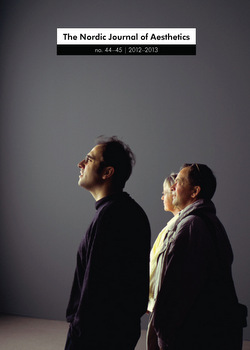Temporalization as Transcendental Aesthetics - Avant-Garde, Modern, Contemporary
DOI:
https://doi.org/10.7146/nja.v23i44-45.8179Keywords:
Avant-Garde, contemporary, modern, repetition, subsumption, temporalization, transcendental aestheticsAbstract
Reflections on the relationship of aesthetics to politics tend to circle, almost compulsively, around a relatively stable set of conceptual oppositions, inherited from German philosophies of the late 18th century. This essay proposes an expansion of the theoretical terms of the debate by extending the field of transcendental aesthetics into the domain of historical temporalization. Fundamental art-historical categories may thereby be incorporated, philosophically transformed, into ‘aesthetics’ as forms of historical temporalization: avant-garde, modern, contemporary. The essay expounds two theses, in particular: 1. The historical subsumption of the temporality of the avant-garde by the temporality of the modern: the modern stands to the avant-garde as the negation of its politics by the repetition of the new –‘the new as the ever–same’; 2. the historical subsumption of the temporality of the modern by ‘the contemporary’: the contemporary stands to the modern as the negation of the dialectical logic – and hence specifically developmentalist futurity – of the new by a spatially determined, but imaginary co-presencing. One effect of this latter subsumption, it is argued, is a particular, regressive ‘repetition of the national’, at the level of cultural representation, on the terrain of the global.Downloads
Published
2014-07-21
How to Cite
Osborne, P. (2014). Temporalization as Transcendental Aesthetics - Avant-Garde, Modern, Contemporary. The Nordic Journal of Aesthetics, 23(44-45). https://doi.org/10.7146/nja.v23i44-45.8179
Issue
Section
Articles
License
Authors who publish with this journal agree to the following terms:
- Authors retain copyright and grant the journal right of first publication with the work simultaneously licensed under a Creative Commons Attribution License that allows others to share the work with an acknowledgement of the work's authorship and initial publication in this journal.
- Authors are able to enter into separate, additional contractual arrangements for the non-exclusive distribution of the journal's published version of the work (e.g., post it to an institutional repository or publish it in a book), with an acknowledgement of its initial publication in this journal.
- Authors are permitted and encouraged to post their work online (e.g., in institutional repositories or on their website) prior to and during the submission process, as it can lead to productive exchanges, as well as earlier and greater citation of published work (See The Effect of Open Access).




